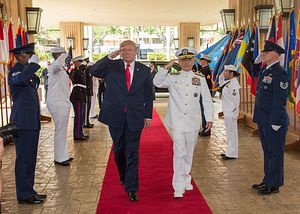On Friday, U.S. President Donald J. Trump announced his intention to nominate Admiral Harry B. Harris, the outgoing commander of U.S. Pacific Command, to serve as U.S. ambassador to South Korea.
The appointment comes days before an anticipated visit by South Korean President Moon Jae-in to Washington, D.C., to meet with Trump before his highly anticipated and historic summit meeting with North Korean leader Kim Jong-un.
Harris, if confirmed, would fill an ambassadorial post that has been vacant for more than a year in an important U.S.-allied state in Northeast Asia. In the absence of an ambassador, U.S. Chargé d’Affaires Mark Knapper has been the top U.S. State Department representative in South Korea.
Despite the Trump administration’s disproportionate attention to the Korean Peninsula in its first year in office, given the rapid pace of North Korean ballistic missile tests last year and diplomatic outreach this year, the post of U.S. ambassador in Seoul has not been filled.
The White House, in its announcement of Harris’ nomination, described him as a “highly decorated, combat proven Naval officer with extensive knowledge, leadership, and geopolitical expertise in the Indo-Pacific region.” Harris appears overwhelmingly likely to win bipartisan support and to be confirmed for the post by the U.S. Senate.
According to earlier reporting, Harris was first said to have been in the running for the U.S. ambassadorship in Canberra, Australia. Harris, in his role as commander of U.S. Pacific Command, played an important role in sustaining the military alliance with Australia.
Harris has been a strong proponent of this administration’s so-called Indo-Pacific strategy and the previous administration’s “rebalance,” both of which have emphasized a sustained forward presence in the Asian region for the U.S. military.
The decision to switch Harris from Canberra to Seoul was taken by U.S. Secretary of State Mike Pompeo shortly after his swearing-in in April, given the urgency of the ongoing diplomacy on the Korean Peninsula.
Harris is a strong proponent of the U.S.-South Korea alliance and has described the threat posed by North Korea’s ballistic missiles and nuclear weapons as the top short-term concern for the United States.
In testimony to the House Armed Services Committee earlier this year, Harris, referencing developments with North Korea in 2017, remarked that the “past year has seen rapid and comprehensive improvement in the DPRK’s ballistic missile and nuclear capabilities, despite broad international condemnation and the imposition of additional United Nations Security Council sanctions.”
“Nobody seeks or desires conflict with the DPRK, but the U.S. and its allies must prepare for the full range of military contingencies,” Harris added.
Harris will be succeeded by Admiral Phil Davidson, the current head of Fleet Forces Command, as commander of U.S. Pacific Command.

































